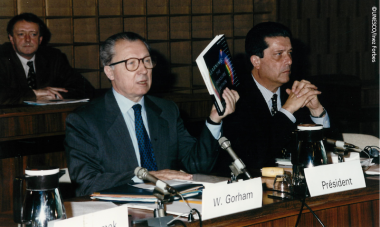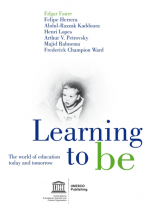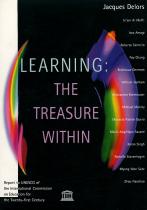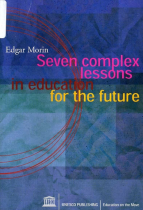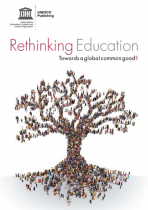The initiative
The context
With accelerated climate change the fragility of our planet is becoming more and more apparent. Persistent inequalities, social fragmentation, and political extremism are bringing many societies to a point of crisis. Advances in digital communication, artificial intelligence, and biotechnology have great potential but also raise serious ethical and governance concerns, especially as promises of innovation and technological change have an uneven record of contributing to human flourishing.
The vision
Knowledge and learning are humanity’s greatest renewable resources for responding to challenges and inventing alternatives. Yet, education does more than respond to a changing world. Education transforms the world.
The aim
This initiative aims to mobilize the many rich ways of being and knowing in order to leverage humanity’s collective intelligence. It relies on a broad, open process of co-construction that involves youth, educators, civil society, governments, business and other stakeholders.
One central piece of the work was guided by a high-level International Commission of thought-leaders from diverse fields and different regions of the world. In November 2021 the commission publish its report Reimagining our futures together: A new social contract for education, which presents a forward-looking vision of what education and learning might yet become and allow us individually and collectively to become.
Key questions
This project uses the concept of futures in the plural in order to recognize that there is a rich diversity of ways of knowing and being around the world. The plural form also acknowledges that there are multiple dimensions to the future and that there will likely be various desirable and undesirable futures – all of which will vary greatly depending on who you are and where you stand. Rather than attempting to chart a single future, looking at futures in the plural validates multiple possible and desirable futures of humanity on our shared planet.
UNESCO’s Futures of Education initiative also approaches the future as a space for democratic design that is connected to, but not limited by, past and present. It builds on dedicated evidence-based trend analysis that can help shine light on anticipated challenges and opportunities. This is complemented by participatory mechanisms for envisioning new possible futures of education. Consultations across world regions will tap the visions and aspirations of a wide range of stakeholders under the understanding that innovation and ownership of the future need to be locally anchored as well as globally discussed.
The project embraces a fluid, iterative, and collective approach to futures-making. The goal is to generate discussion and action on the role of education, knowledge and learning in view of the predicted, possible and preferred futures of humanity and the planet.
Education is a key piece of the 2030 Agenda for Sustainable Development. Despite the scope of these global commitments and the expected achievements, there is still an urgent need to look beyond this fast-approaching horizon. While the Education 2030 Incheon Declaration and Framework for Action lays out a roadmap for the transformation of education systems and affirms a central commitment to inclusion and equity, we must still ask what education might yet become – and what education might yet enable us to become. UNESCO’s Futures of Education initiative uses the horizon of 2050 and beyond in order to anticipate and shape both nearer and more distant futures.
Advisory Board
The Future of Education Advisory Board supported UNESCO and the International Commission during the preparation of the Reimagining our futures together: A new social contract for education report. It was composed of leading figures and key strategic partners in global education, research and innovation. The Board provided strategic guidance to UNESCO on the Futures of Education initiative, including input on content, process and outreach.
-
March 2020 Advisory Board meeting (report available here)
-
June 2020 Advisory Board meeting (report available here)
-
September 2020 Joint meeting of Advisory Board and International Commission (report available here)
-
October 2020 Special joint session on the future of life long learning held in conjunction with UNESCO's Institute for Lifelong Learning (UIL)
-
November 2020 Special joint session on the future of teaching and the teaching profession held in conjunction with Education International (EI)
-
November 2020 Special joint session on the future of higher education held in conjunction with the International Association of Universities (IAU)
-
December 2020 Special joint session on the future of the right to education held in conjunction with the Special Rapporteur on the Right to Education
-
February 2021 Second special joint session on the future of the right to education held in conjunction with the Special Rapporteur on the Right to Education
-
October 2021 Advisory board meeting with the Chair of the International Commission on the Futures of Education
Advisory Board Members
Mr Tariq Al Gurg
Chief Executive Officer, Dubai Cares

Ms Alice P. Albright
Chief Executive Officer, Global Partnership for Education (GPE)

Mr Gordon Brown
UN Special Envoy for Global Education

Ms Annette Dixon
Vice President for Human Development, The World Bank Group

Ms Henrietta Fore
Executive Director, UNICEF

Ms Susan Hopgood
President, Education International

Mr Carlos Moedas
Commissioner 2014 2019, European Commission, Research Science and Innovation

Mr Matías Rodríguez Inciarte
President of Santander Universidades and Vice President of Universia

Mr Refat Sabbah
President, Global Campaign for Education

Mr Jeffrey D Sachs
Director, Center for Sustainable Development, Columbia University

Ms Cecilia Scharp
Deputy Director General, Swedish International Development Cooperation Agency

Mr Andreas Schleicher
Director for the Directorate of Education and Skills, OECD

Ms Alette Van Leur
Director, Sectoral Policies Department, International Labour Organization

Ms Hilligje van’t Land
Secretary General, International Association of Universities

Ms Yume Yamaguchi
Director, Institute for the Advanced Study of Sustainability, United Nations University

UNESCO global reports on education
Part of a UNESCO tradition
The Reimagining our futures together: A new social contract for education is the latest in a series of global reports commissioned by UNESCO to grapple with the challenges that the future holds in store and to inspire change and issue policy recommendations for education.
The first of these reports, Learning to Be: the world of education today and tomorrow was developed in 1971-1972 and prepared by a commission chaired by Edgar Faure, a former Prime Minister and Minister of Education of France. The Learning to Be report warned of the risks of inequalities, privation and suffering and emphasized the universal features education. The Faure report called for the continued expansion of education and for lifelong education.
From 1993-1996 a second international commission under the leadership of Jacques Delors, former President of the European Commission and former French Minister of Economy and Finance, prepared a report that was published as Learning: The Treasure Within. This report further emphasized the importance of a humanistic approach to education and established “the four pillars” of education, namely: learning to be, learning to know, learning to do, and learning to live together.
Among other important UNESCO publications on education in the intervening years is the 2015 report. Rethinking Education: towards a global common good? which proposed a rethinking of education and knowledge as global common goods.
All of these initiatives, as well as UNESCO’s work broadly across the Education Sector, inform this latest global report. Reimagining our futures together: A new social contract for education builds on this tradition and lays out an agenda for education policy dialogue and action at multiple levels.

